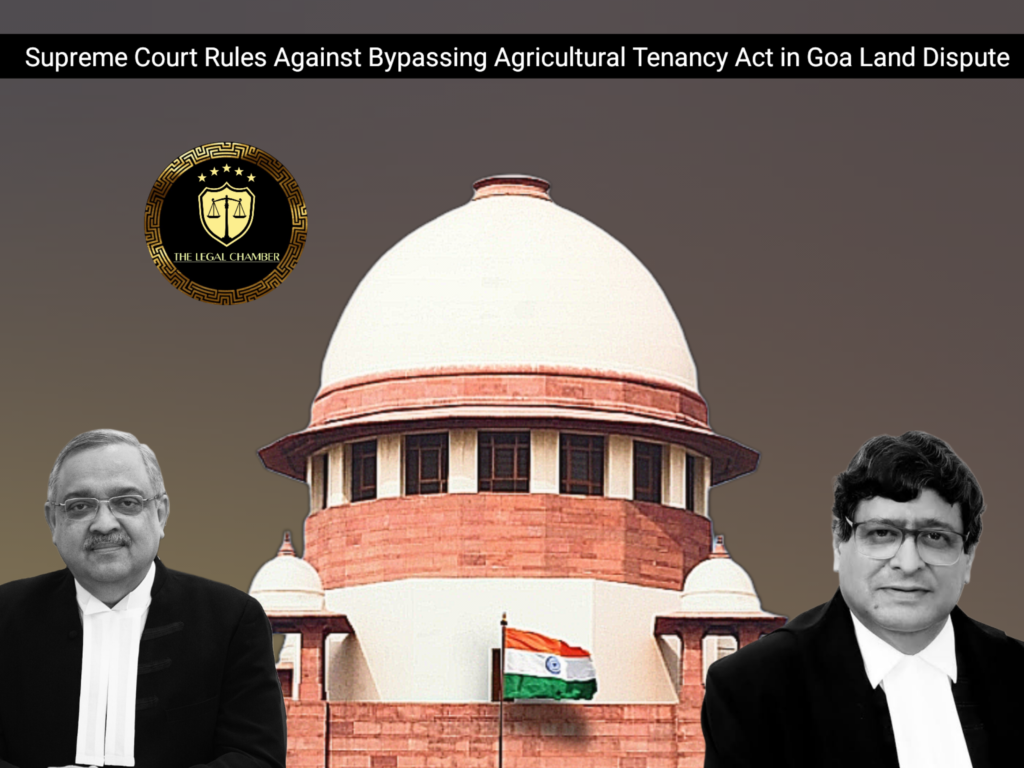
The Supreme Court upheld the High Court’s decision, affirming that the Administrative Tribunal rightly denied permission for a compromise between the Communidade of Tivim and private respondents. The proposed consent terms violated the Goa Agricultural Tenancy Act, 1964, and the Goa Land Use Act, 1991, by attempting to confer ownership rights and permit non-agricultural use without following statutory procedures. The Court emphasized that such compromises cannot bypass legal frameworks or undermine tenancy rights. The appeal was dismissed, leaving the tenancy dispute to be adjudicated on merits by the Appellate Court.
Facts Of The Case:
The case involves the Communidade of Tivim, an agricultural association in Goa, which challenged the dismissal of its writ petition by the High Court of Bombay at Goa. The dispute arose over two properties leased to the predecessors of private respondents in 1978. In 1986, a civil court decreed the predecessors as tenants, and this decision attained finality. Later, in 2016, the private respondents sought a declaration of tenancy under the Goa Agricultural Tenancy Act, 1964, which was granted ex parte in 2017. The Communidade appealed this decision, and during the pendency of the appeal, it proposed a compromise to bifurcate the land in a 60:40 ratio, granting 60% to the private respondents and retaining 40%. However, the Administrative Tribunal refused permission for this compromise, citing violations of the Tenancy Act and the Goa Land Use Act, 1991. The High Court upheld the Tribunal’s decision, leading the Communidade to appeal to the Supreme Court. The Supreme Court agreed with the lower courts, ruling that the compromise circumvented statutory procedures for terminating tenancy and unlawfully conferred ownership rights, including non-agricultural use of the land. The appeal was dismissed, with the Court directing the pending tenancy appeal to be decided on its own merits.
Procedural History:
The procedural history of the case begins with the **Tenancy Application No. 71/2016** filed by the private respondents before the Civil Judge, Junior Division, Bicholim, seeking a declaration of tenancy under Section 7 of the **Goa Agricultural Tenancy Act, 1964**. The court granted the application ex parte on **01.09.2017**, declaring the respondents as tenants. The **Communidade of Tivim** then filed a **Tenancy Appeal** before the Ad-hoc District Judge-I, Mapusa, which remained pending. During the appeal, the Communidade proposed a **compromise agreement** (60:40 land division) and sought approval from the **Administrative Tribunal, Goa**, as required under **Article 154(3) of the Code of Comunidades**. The Tribunal **rejected** the compromise on **13.04.2023**, holding it violated tenancy laws. The Communidade challenged this before the **High Court of Bombay at Goa**, which **dismissed** the writ petition on **06.08.2024**, upholding the Tribunal’s decision. The matter then reached the **Supreme Court** via a **Special Leave Petition**, which, after condoning a **146-day delay**, **dismissed** the appeal on **14.07.2025**, affirming that the compromise was impermissible under the **Tenancy Act** and **Land Use Act**. The Court directed the pending tenancy appeal to be decided on **merits**.
READ ALSO :Supreme Court Clarifies Compensation Rules for Loss of Dependency in Fatal Accident
Court Observation:
The Supreme Court made several key observations while dismissing the appeal. It held that the **proposed compromise agreement** between the Communidade and the private respondents was **contrary to statutory provisions** under the **Goa Agricultural Tenancy Act, 1964** and the **Goa Land Use Act, 1991**. The Court noted that the agreement sought to **bypass legal procedures** by conferring **full ownership rights** on the tenants without following the **mandatory process** for land purchase under **Chapter IIA of the Tenancy Act**, which includes public notices, price determination, and restrictions on land transfer. Additionally, the Court observed that the compromise allowed **non-agricultural use** of the land, violating **Section 2 of the Land Use Act**, which strictly limits tenanted land to agricultural purposes. The Court emphasized that **Article 154(3) of the Code of Comunidades** does not grant **unfettered power** to compromise in a manner that **undermines statutory protections**. It upheld the **Administrative Tribunal’s refusal**, stating that permitting such agreements would **defeat the purpose of tenancy laws** and encourage **circumvention of legal safeguards**. The Court clarified that its ruling did not affect the **pending tenancy appeal**, which must be decided independently on **merits**.
Final Decision & Judgement:
The Supreme Court dismissed the appeal, upholding the decisions of both the High Court of Bombay at Goa and the Administrative Tribunal, Goa. The Court ruled that the proposed 60:40 compromise agreement between the Communidade of Tivim and the private respondents was legally impermissible, as it violated key provisions of the Goa Agricultural Tenancy Act, 1964 and the Goa Land Use Act, 1991. The Court emphasized that the agreement improperly sought to convert tenancy rights into full ownership without following the statutory process under Chapter IIA of the Tenancy Act, which mandates specific procedures for land purchase by tenants, including public notices and price determination. Additionally, the Court found that the compromise unlawfully permitted non-agricultural use of the land, contravening Section 2 of the Land Use Act. The judgment reinforced that Article 154(3) of the Code of Comunidades does not authorize compromises that override statutory protections or undermine tenancy laws. While dismissing the appeal, the Court clarified that its decision did not prejudice the pending tenancy appeal, which must be adjudicated on its own merits in accordance with the law. No costs were awarded, and all pending applications, if any, were disposed of accordingly.
Case Details:
Case Title:Communidade of Tivim Bardez Goa vs. State of Goa & Ors. Citation:Diary No. 16901/2025 Date of Judgment:July 14, 2025 Judges/Justices: Justice Sudhanshu Dhulia & Justice K. Vinod Chandran
Download The Judgement Here